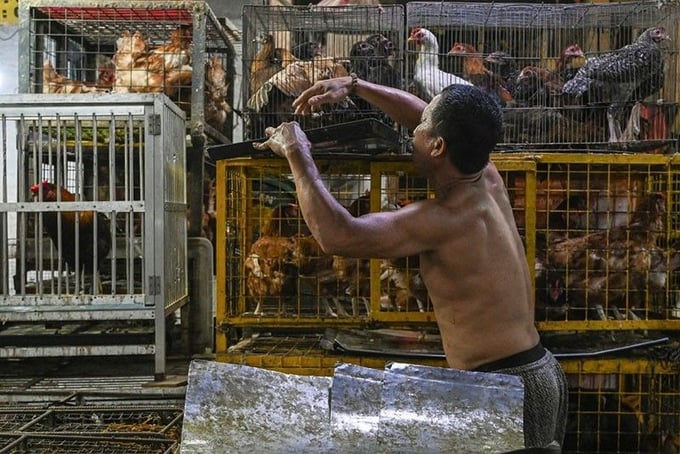The Philippine government on June 8 announced a ban on poultry imports from Australia, which is facing an outbreak of highly pathogenic avian influenza (HPAI) H7N3 and H7N9.
A poultry vendor at a market in Manila, the capital of the Philippines, on May 9. Image: AFP.
The Philippine Department of Agriculture has banned the importation of poultry and wild birds from Australia, citing concerns over the highly pathogenic avian influenza (HPAI) H7N3 and H7N9 strains. The ban is effective immediately, Philippine officials said, “to prevent the introduction of HPAI viruses into the domestic poultry population.”
Agriculture Secretary Francisco Tiu Laurel Jr. issued Memorandum No. 21, directing the Bureau of Animal Industry to suspend the issuance of import and quarantine permits for poultry from Australia, including poultry meat, day-old chicks, eggs and semen.
“All incoming shipments from Australia that were transported, unloaded and licensed prior to the announcement of this decision will be allowed to enter the Philippines provided that the products are slaughtered or produced before May 9, 2024,” the memorandum signed by Laurel on June 6 said.
The Australian Chief Veterinary Officer reported the virus outbreak to the World Organisation for Animal Health.
Specifically, the outbreaks were detected on May 23 in Meredith and May 25 in Terang, Victoria, confirmed by the Australian Center for Disease Control.
As of April 2024, Australia was the Philippines’ fourth largest source of chicken meat imports, supplying 5,365 tonnes per year. Australia is also a major supplier of boneless chicken meat and day-old chicks.
Experts say bird flu occurs mainly in wild birds and poultry on farms, and human-to-human transmission is extremely rare.
The H7N9 strain of bird flu, first detected in 2013, has been responsible for the majority of bird flu deaths in humans, according to the US Centers for Disease Control (CDC).

